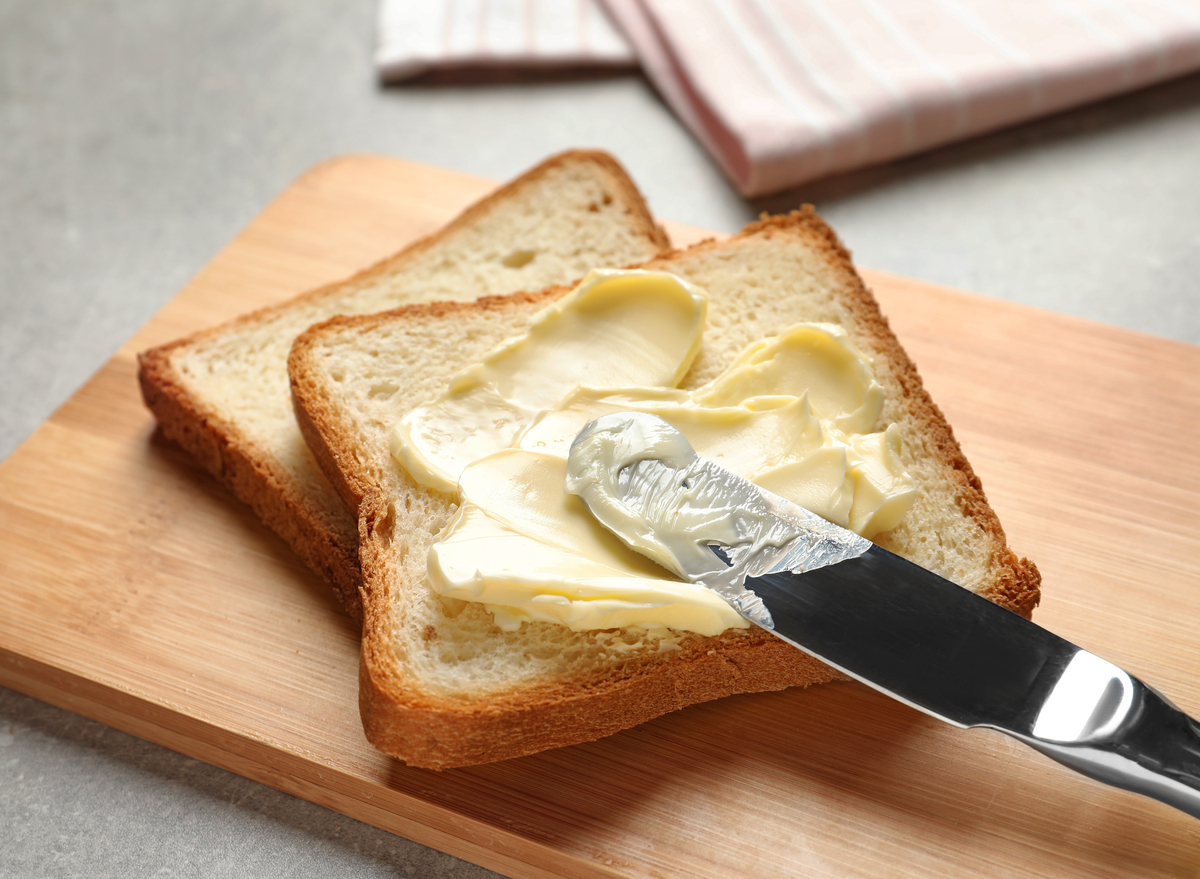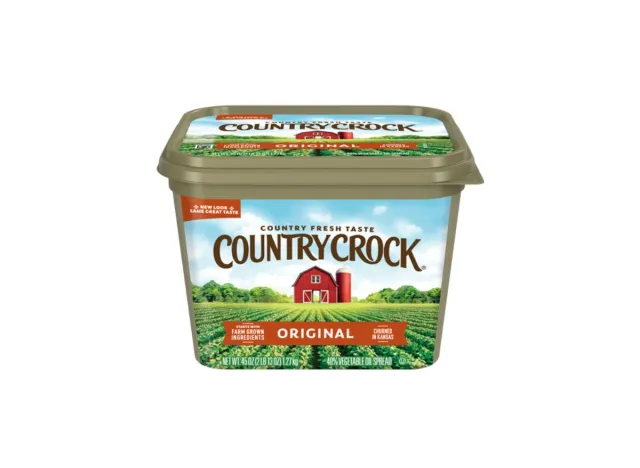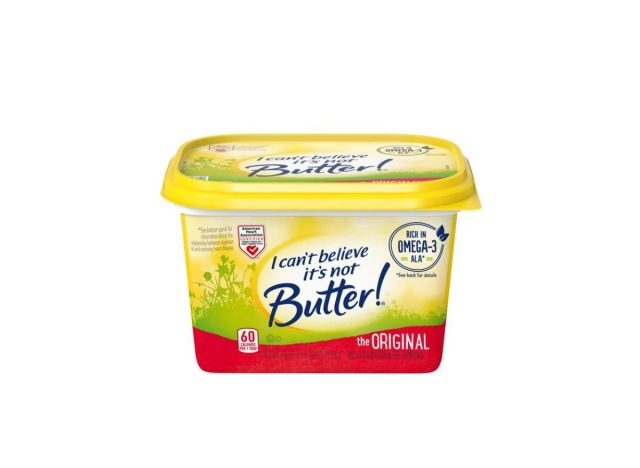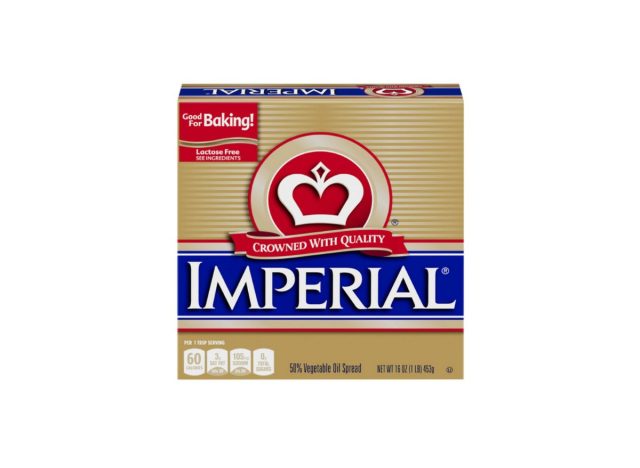6 Lowest Quality Butter Brands, According to Dietitians

Butter has earned itself quite the controversial label, in terms of being a nutritional product. While the research continues to show that incorporating a small amount of butter into your diet can be totally safe for most people, this doesn't change the fact that not all butter products are created equally and some butter brands are worse than others.
When evaluating the quality of a butter product, the key is to look at the type of ingredients that are included. Specifically, butter is traditionally made with just cream and salt. However, many of the pseudo-butter products on the market have a slew of extra ingredients and added oils that can make these products higher in fat and all around less healthy.
According to the American Heart Association, it's recommended that you try to keep the amount of saturated fats you consume between 5–6% of your total daily calories. This equals about 14 grams of saturated fat per day or one tablespoon of butter. Products that use heart healthy oils or add omega-3s can improve the quality of the product and its health-promoting properties.
To help you avoid some of the worst butter brands currently on grocery store shelves, we spoke to registered dietitians and nutrition experts to find out exactly what to look for in your butter products—particularly which ones to steer clear of. Read on to find out exactly which butter brands are among those to offer the lowest quality butter and butter-adjacent spreads on the market. Then to find out which butters are among the best, be sure to check out the 10 Highest-Quality Butter Brands, According to a Dietitian.
1. Country Crock Buttery Spread

Tub-based butters or butter products like margarine, such as Country Crock® Original, are often smoother and more spreadable because of the oils incorporated into the ingredients. Although this product might taste delicious, taste and spreadability doesn't necessarily make it healthier.
"Tub butters often are the worst; they are usually loaded with unhealthy oils that make them more spreadable," explains Moushumi Mukherjee, MS, RDN, of Dietitian Moushumi LLC.
Oftentimes, companies use these oils to increase a product's shelf life and meet consumer demands. Next time you're looking for a healthier alternative of a buttery spread that also uses oils, consider an option that supports the product's spreadability with oils that are more conducive to your heart's health like olive oil, avocado oil, and flaxseed oil.
2. Parkay
Despite some questions around to what extent regular butter can be incorporated into a healthy diet, many dietitians agree that margarine is still out. When it comes to brands offering unhealthy butter products, this recognizable household name brand might ring a bell.
"Parkay is a margarine made mostly with soybean, palm, and palm kernel oil. It does contain a small amount of milk, but more than half is vegetable oil, which is deceiving as the packaging shows a big picture of milk and the slogan [is] 'made with real milk,'" says Kelsey Kunik, RDN, a nutrition advisor for Zenmaster Wellness."Palm oil and palm kernel oil is higher in saturated fats than other plant oils, and is a contributor to deforestation and various environmental concerns."
3. Smart Balance
"Margarines may be less calories than real butter, but they are a worse choice than a small amount of real butter," shares Molly Snyder, RDN, of Full-Filled Nutrition. "One of my least favorites is Smart Balance. Although the name implies that this is a smart choice for a balanced diet, it is not. Smart Balance is made of a blend of vegetable oils, salt, and added flavors and colors. This is not a healthy alternative to butter."
However, Smart Balance does have a heart healthy line of products made with olive oil, flaxseed oil, and is high in omega-3s that you might find is a healthier choice for you.
4. I Can't Believe It's Not Butter

The '90s called, and they want their butter back! This classic butter product, particularly the spray, gives the illusion of a healthier choice. However, a serving of spreadable product contains saturated fat from palm oil as well as vegetable oil. While this product is overall lower in calories, the quality is compromised from the added ingredients here.
Chef Julie Andrews, MS, RDN, FAND, agrees. "Check the label of tub margarine and butter products, like I Can't Believe It's Not Butter and Smart Balance," she says. "Bonus points if it's made with a heart-healthy fat like olive oil."
5. Trader Joe's Vegan Buttery Spread
Vegan options often sound and seem healthier given the lack of dairy or other animal products, right? This is perhaps true in some cases, but not always when it comes to certain brands of vegan butter. Take Trader Joe's Vegan Buttery Spread, for instance.
"I love Trader Joe's products, but I do not recommend their Vegan Buttery Spread," says Sheri Berger, RDN, CDCES. "I've heard complaints from clients that the TJ spread does not melt well and the texture feels very 'plasticky.' The main ingredient in the TJ spread is coconut oil, and that gives it a higher saturated fat content."
"I encourage my cardiac clients to choose spreads that have less saturated fat such as Earth Balance," she adds. "Earth Balance has 3 grams of saturated fat per tablespoon compared to 7 grams per tablespoon in the TJ buttery spread."
6. Imperial Vegetable Oil Spread Sticks

While perusing the butter isle of the grocery store, you might notice Imperial as a long-standing member of the different butter products in this section. However, Imperial is similar to many of the other pseudo-butter options. Made with a blend of vegetable oils, one serving delivers 3 grams of saturated fat.









